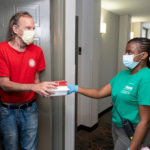 To say that the past year has been difficult would be an understatement. We have faced immense loss, grief, challenge, and change at the hands of COVID-19—but in the face of terrific adversity, advocates, service providers, and supporters across Canada have continued to advance their work to end homelessness.
To say that the past year has been difficult would be an understatement. We have faced immense loss, grief, challenge, and change at the hands of COVID-19—but in the face of terrific adversity, advocates, service providers, and supporters across Canada have continued to advance their work to end homelessness.
Homelessness has followed a relentless and lethal trajectory in our country for decades, growing year after year and putting over 235,000 lives at risk annually. COVID-19 put people experiencing homelessness at dramatically increased risk of illness and death, cast more people into homelessness, and worsened the ongoing opioid crisis.
Over the past year, housing advocates, supporters, and frontline workers have worked tirelessly to keep people safe and healthy during the pandemic while turning this tragedy into an opportunity to accelerate progress toward ending homelessness. Below are some highlights of progress made by communities across Canada:
- Before the pandemic was even declared, the Canadian Network for Health and Housing of People Experiencing Homelessness (CNH3) was raising the alarm and preparing measures to support the homeless sector respond to COVID-19.
- Within weeks of the pandemic being declared, communities across Canada launched rapid rehousing initiatives, additional emergency shelter, and isolation and quarantine spaces.
- By May 2020, Built for Zero communities like Chatham-Kent were using COVID-19 housing–focused shelter to offer housing supports and services for people experiencing homelessness.
- By July 2020, Peel had housed over 287 people and Toronto had housed over 1,300 people through their COVID-19 response.
- In August 2020, amid the global pandemic and a flood, Fort McMurray achieved quality chronic and veteran homelessness By-Name Lists (BNLs), Reaching Home quality Coordinated Access and dramatic reductions in chronic homelessness.
- By December 2020, St. John had reduced chronic homelessness by 10%.
- By February 2021, five Built for Zero communities achieved veteran QBNLs: Kingston, Fort McMurray, London, Moncton, and Saint John.
- Fort McMurray, Guelph-Wellington, and Saint John all achieved measurable reductions in chronic homelessness.
- Saint John and Windsor-Essex recently achieved Reaching Home quality Coordinated Access, while Dufferin County is the first community to confirm Advanced quality Coordinated Access thanks to their commitment to continuous improvement.
- In February 2021, London made history as the first community in Canada to end veteran homelessness.
We applaud all communities, individuals, and organizations working to end homelessness across Canada—your urgent and compassionate efforts are both inspiring and impactful.
Shifting to recovery—we cannot go back to “normal”
People experiencing homelessness have faced disproportionately high rates of COVID-19 infection, while already-marginalized, vulnerable, and low-income peoples continue to bear the brunt of pandemic-related job loss and housing precarity.
On the anniversary of the declaration of the pandemic, we can see light at the end of the tunnel with vaccines reaching more and more Canadians. We all want life to go back to normal, but we can’t go back to the old normal—a normal where over 235,000 different people experience homelessness and are at life–threatening risk each year because of policies that fail to ensure that everyone has access to a home.
To ensure we ‘build back better’ from the pandemic, CAEH launched the Recovery for All campaign in May 2020, outlining a 6-point plan for ending homelessness. To date, it has gained over 22,000 supporters who have sent over 700,000 letters to parliamentarians.
Supporters of Recovery for All have secured a federal commitment to end chronic homelessness and a $1 billion Rapid Housing Initiative. Recovery for All is now pushing for a meaningful investment in the federal commitment to ending chronic homelessness in the upcoming budget.
In May 2020, the Women’s National Housing & Homelessness Network also urged all levels of government to implement nine measures to protect women, girls, children, and gender-diverse peoples experiencing homelessness and domestic violence during the COVID-19 pandemic. Both federal and provincial governments have begun heeding these calls to action, as evident from their recently launched gender equality task force and supports for Black women and girls and woman-led businesses, among others.
Meanwhile, in response to Canada’s growing arrears and evictions crisis, the National Right to Housing Network (NRHN) and the Centre for Equality Rights in Accommodation (CERA)—in collaboration with over 120 individuals and organizations—released a federal proposal for a Residential Tenant Support Benefit in February 2021. This right to housing submission under the National Housing Strategy Act recognizes eviction as a systemic issue affecting already-marginalized tenants like women, low-income workers, Black and Indigenous peoples, queer households, and persons with disabilities most, and has received support from hundreds of housing advocates—via letters sent to their Ministers—in a matter of weeks.
Thank you
Together, we have overcome immense obstacles in the past year thanks to a growing movement of people, partners, and organizations rising to the occasion and remaining focused on the shared goal of ending homelessness. We’ve come a long way in protecting our homeless neighbours—however the ongoing COVID-19 pandemic provides a tragic and costly reminder of the urgent need to end homelessness in Canada, once and for all.
We cannot rest until all Canadians have safe, decent, and permanent housing where they can be protected from the ravages of another pandemic.
We also thank all frontline workers for your incredible work in keeping us safe. Your ongoing efforts are truly essential.
ADDITIONAL RESOURCES:
One way the CAEH is supporting communities during COVID-19 is by working with the Canadian Network for Health and Housing of People Experiencing Homelessness to post resources and tools. Those resources can be found by clicking here.
